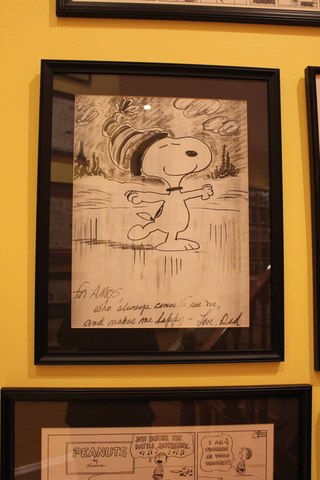“There are three things that I’ve learned never to discuss with people,”says the endearing Peanuts character Linus Van Pelt. “Religion, politics, and the Great Pumpkin.”
In classic Peanuts style, this quote shows a maturity and insight beyond Linus’ limited years, speaking of a truth its creator, Charles M. Schulz, knew from experience.
“He always said, ‘If you want to know me, read my strip,’” Amy Schulz Johnson says, speaking of her father, Charles Schulz. “You could tell the things he believed in by reading Peanuts.”

Comic strip hanging in Amy Schulz Johnson’s home, one her father created for her after hearing of the difficulties she had on her mission with people slamming doors in her face. (Image via ldsliving.com)
Yet, many fans and critics of Schulz’s work disagree on his religious views, labeling him as everything from a fundamentalist Christian to an atheist. But those closest to Schulz and his work understand that, though complex and highly personal, his faith and belief in the Savior fueled every decision in his life. In fact, it was this deeply ingrained personal conviction that led him to go against Linus’ wise counsel and share his beliefs across the nation through the characters in his comic strip.
A Man of Faith in Action
“Throughout my entire life, I have seen my dad’s faith in action,” Johnson says. “I remember there was a big yellow chair in our old house, and every day he used to sit there and read scriptures.”
And though not a Methodist or member of any other organized religion, Johnson recalls that “every Sunday he taught Sunday School at a Methodist church at our little town in northern California for 12 years.”
While a witness to his example, Johnson admits that her father was very private about his faith and beliefs. They were something he lived, not something he openly shared, preached, expected his children to live.
And therein lies the paradox of this great man, who held his beliefs so close and private, yet dared through his work to spread messages of hope, values, grace, and even Jesus Christ publicly, in a profession that usually ridiculed such things.
“He wasn’t afraid to put his faith in Peanuts,” Johnson says. “He felt that his characters were serious enough to be able to have things like scriptures in the strip. He never liked it when people referred to the strip as ‘just for kids’ just because it was little kids voicing the feelings and ideas—but the strip was not for children, it was more for adults. He was really proud of that.”

Comic strip hanging in Amy Schulz Johnson’s home with a personal note that reads “To Amy—because you’re special—Dad.” (Image via ldsliving.com)
Using the innocent voices of children, Charles Schulz taught readers of all ages across decades about the fundamentals of life—about family, failure, education, imagination, and so much more.
“There are lots of kids out there living terrible lives, where literally the only thing that saved them was the Peanuts comic strips,” Johnson says. “It’s amazing; their stories are incredible.”
Schulz’s most stirring demonstration of faith came in the form of A Charlie Brown Christmas, a short animated television special that debuted on December 9, 1965. In the special, there’s a moment when Linus tells Charlie Brown what Christmas is really all about, quoting the story from Luke 2:8-14—a moment that generated a lot of controversy at the time.

Drawing of Snoopy hanging in Amy Schulz Johnson’s home, one her dad personally created and signed for her because of her love of ice skating. (Image via ldsliving.com)
“His producer and director said, ‘You can’t do this,’ and he said, ‘If we don’t do it, who will?’” Johnson recalls. “So they put it in. They showed it to CBS that year, and all the bigwigs in Hollywood didn’t like it at all. They said, ‘We’ll air it. But you shouldn’t have those religious things in there, so it will only air this one year and that’s it.’”
That year, A Charlie Brown Christmas received high ratings from viewers and acclaim from critics. Since that time, it has been honored with an Emmy and Peabody Award and has aired on television every single year since its debut.
Learning About the Latter-day Saints
Charles Schulz’s faith and relationship to his daughter took on a new dimension after Johnson joined the LDS Church.
Johnson’s first draw to the Church came in the form of an LDS boyfriend, whom she would ask questions about his faith.
“He explained to me about things like the Word of Wisdom, that Mormons didn’t believe in drinking,” Johnson remembers. “I was stunned. I thought my family was the only one that lived like that and I never thought I’d find someone else who felt that way.”
Johnson was initially attracted to the Church more because of the lifestyle than the religion itself. Having not grown up with a specific religion, many of the ideas were new and strange to her. But even after breaking up with her boyfriend, Johnson continued investigating the Church.
“I stayed in the Church because the lifestyle reminded me of how I grew up,” she says. “But I essentially joined for myself, not my boyfriend. It matched perfectly with all the things I’d been taught.”
READ THE REST OF THIS ARTICLE AT LDS LIVING










